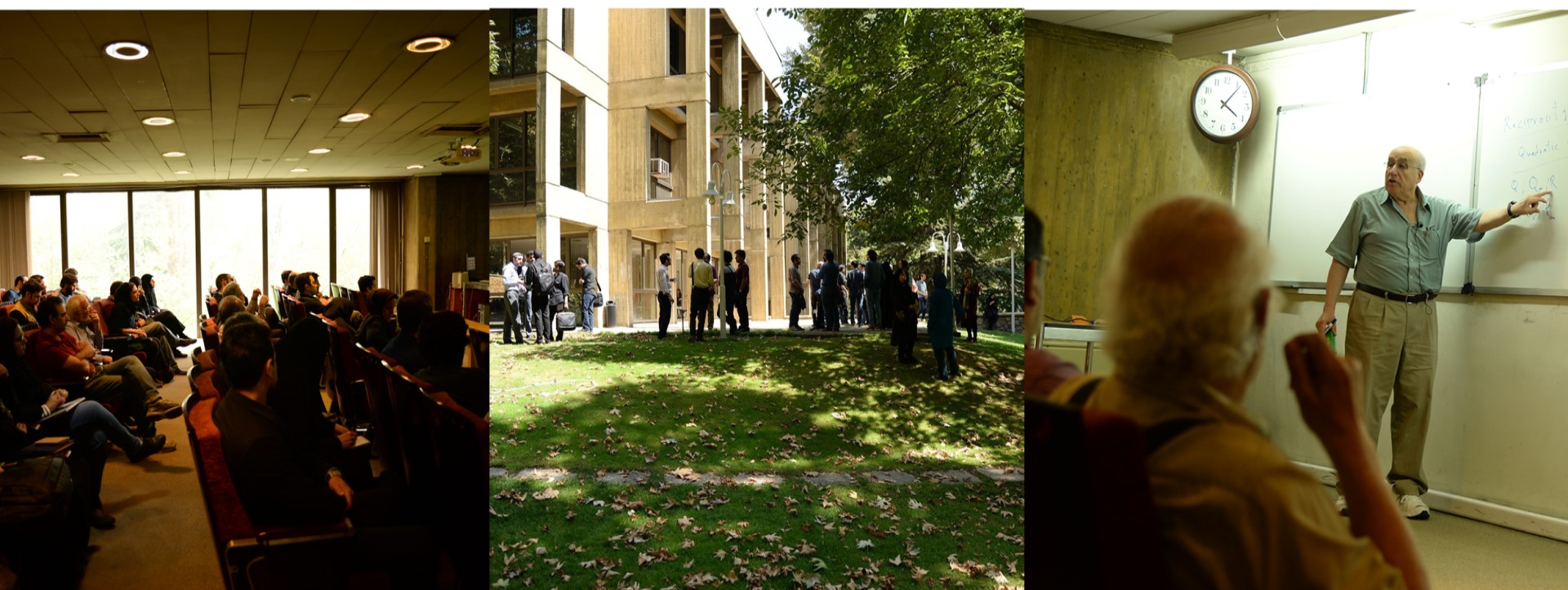
FGC-HRI-IPM Joint Number Theory Seminar
Past Talks
Speaker: Tomos Parry, Bilkent Univ., Ankara
Title: Primes in arithmetic progressions on average
Date: December 18, 2024
Speaker: Andrea Ferraguti, Università di Torino
Title: Frobenius and settled elements in iterated Galois extensions
Abstract:Understanding Frobenius elements in iterated Galois extensions is a major goal in
arithmetic dynamics. In 2012 Boston and Jones conjectured that any quadratic polynomial f over a
finite field that is different from x^2 is settled, namely the weighted proportion of f-stable factors
in the factorization of the n-th iterate of f tends to 1 as n tends to infinity. This can be rephrased
in terms of Frobenius elements: given a quadratic polynomial f over a number field K, an element \alpha in
K and the extension K_\infty generated by all the f^n-preimages of \alpha, the Frobenius elements
of unramified primes in K_\infty are settled. In this talk, we will explain how to construct
uncountably many non-conjugate settled elements that cannot be the Frobenius of any ramified or
unramified prime, for any quadratic polynomial. The key result is a description of the critical
orbit modulo squares for quadratic polynomials over local fields. This is joint work with Carlo Pagano.
Date: December 4, 2024
Speaker: Amina Abdurrahman, IHES
Title: A formula for symplectic L-functions and Reidemeister torsion
Abstract: We give a global cohomological formula for the central value of the
L-function of a symplectic representation on a curve up to squares. The
proof relies crucially on a similar formula for the Reidemeister torsion
of 3-manifolds together with a symplectic local system. We sketch both
analogous arithmetic and topological pictures. This is based on joint
work with A. Venkatesh.
Date: November 20, 2024
Speaker: Erman Isik, The University of Ottowa
Title: The growth of Tate-Shafarevich groups of p-supersingular elliptic curves over anticyclotomic Zp-extensions at inert primes
Abstract: In this talk, we will discuss the asymptotic growth of both the Mordell-Weil ranks and the
Tate–Shafarevich groups for an elliptic curve E defined over the rational numbers, focusing on its behaviour
along the anticyclotomic Zp-extension of an imaginary quadratic K. Here, p is a prime at which E has good
supersingular reduction and is inert in K. We will review the definitions and properties of the plus and minus
Selmer groups from Iwasawa theory and discuss how these groups can be used to derive arithmetic information about the elliptic curve.
Date: November 6, 2024
Speaker: Ahmed El-Guindy, Cairo University
Title: Some l-adic properties of modular forms with quadratic nebentypus and l-regular partition congruences
Abstract: In this talk, we discuss a framework for studying l-regular partitions by defining a sequence of modular forms of
level l and quadratic character which encode the l-adic behavior of the so-called l-regular partitions.
We show that this sequence is congruent modulo increasing powers of l to level 1 modular forms of increasing weights.
We then prove that certain modules generated by our sequence are isomorphic to certain subspaces of level 1
cusp forms of weight independent of the power of l, leading to a uniform bound on the ranks of those modules
and consequently to l-adic relations between l-regular partition values. This generalizes earlier work of Folsom,
Kent and Ono on the partition function, where the relevant forms had no nebentypus, and is joint work with Mostafa Ghazy.
Date: October 24, 2024
Speaker: Ali Partoford, IPM
Title: Prismatic higher displays
Abstract: In this talk we define the notion of prismatic (G,\mu)-)displays over quasi-syntomic rings.
In the case of GL_n prismatic displays are the same as admissible Dieudonné modules defined by Anschütz and Le
Bras and therefore classify p-divisible groups. We discuss the deformation theory of prismatic displays and
their relation with the points of integral Shimura variety over quasi-syntomic rings.
Date: October 9, 2024